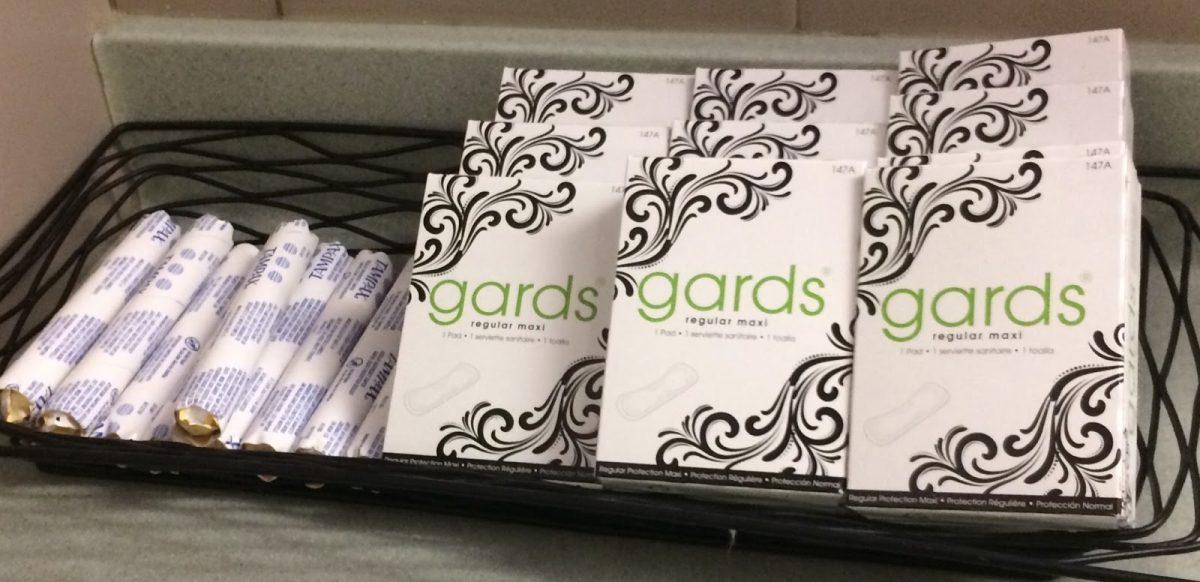
Having menstrual products in bathrooms helps menstruators feel more comfortable in their daily lives. Photo by Kiran Weasel.
Young women today encounter many roadblocks to reaching and fulfilling their aspirations. One of these roadblocks is their menstrual cycle, commonly known as a period. A period is a process in which a woman’s body releases the uterine tissue it no longer needs by bleeding it out. This process usually lasts around a week, happens once a month, and is accompanied by hormone changes. These changes can cause many symptoms such as cramps, headaches, muscle pains and more. Women or people who menstruate, known as menstruators, are often portrayed as crazy, overdramatic, and unpredictable during their menstrual cycle, which inevitably silences the discussions of a very natural process. This silence prevents a necessary conversation that needs to happen for both menstruators and non-menstruators, as well as those who don’t understand the serious and lasting social impacts of the menstrual cycle.
The menstrual movement has many people to thank for its overwhelming success in the last few years. Nadya Okamoto is one of them. Okamoto founded PERIOD when she was 16 and attending Catlin Gabel High School. PERIOD is the fastest growing non-governmental organization in the world. It is run by youth who help those that don’t have access to menstrual care products. Okamoto was inspired to start PERIOD after her family was without a home of their own for many months. On her commute to and from school, she had conversations with women that were in worse living situations than herself and they “inspired [her] to learn more about menstrual inequity and period poverty after collecting an anthology of stories of their using toilet paper, socks, brown paper grocery bags, cardboard, and more, to take care of something so natural.” PERIOD operates through both the Portland-based team as well as through chapters located at schools worldwide. These chapters function through service, education, and advocacy in their communities and have helped supply care for almost 500,000 periods. Okamoto released her own book, Period Power: A Manifesto for the Menstrual Movement, in October of 2018. The book focuses on Okamoto’s journey in starting PERIOD as well as on an effort to engage youth in activism.
While PERIOD and Nadya Okamoto are facilitating change through activism connected to politics, others are taking a creative route. The short film Period. End Of Sentence was released in April of 2018. The film follows a group of women in India who fight against the negative stigma around menstruation. It also follows them as they make affordable and biodegradable pads for other women in their communities. The film was nominated for an Oscar and won for best documentary short in 2019. This win aided reignition of the menstrual movement and proved that menstrual equality is in progress as the reality menstruators face is being incorporated into television more and more. In an article written by Nadya Okamoto in Teen Vogue, Okamoto says “[a]ctivists and academics have been fighting for decades (and probably longer, given that menstruation has existed since the beginning of human life) to destigmatize menstruation and this Oscar win is a milestone moment in that fight to smash the taboo.” The film brought more attention to the cause and helped to educate those who weren’t aware of the misconceptions learn what they are and how to minimize them for future menstruators.
The topic of periods in high schools remains disapproved, as general misconceptions about periods get tossed around in the hallways. This can lead to lots of frustrations from menstruators, while at the same time silencing them. Something almost every menstruator can relate to is that moment when someone often a man, calls out, “must be that time of the month again” or something similar, giving an underlying tone of “look who’s being moody today.” While they may not be inaccurate when it comes to actual moods, the whole illusion of menstruators being cranky only when on their periods is unacceptable. During this time of the month, menstruators’ estrogen levels will decrease, which causes the serotonin levels to decrease. Serotonin is known to regulate mood, appetite, memory and social behavior, which explains why menstruators’ moods can rapidly change. However, it should be noted that not everyone has the same symptoms. Although the traditional indication of having periods is being cranky and hormonal, it does not mean it happens to everyone. There are many who get food cravings, or even feel better when their period does occur. Another common misconception of having your period is the disgusting nature of it. Getting your period shouldn’t be something to be ashamed of, as it happens to many, yet high schoolers can barely mention the word “period” without scrunching their face into a disgusted frown. “Periods have long been considered a women’s issue and are often considered taboo, dirty, and something that should only be discussed quietly among women,” states Okamoto. The reality is that periods are completely natural and need to be valued as such, and the only way such topics will be able to be to be de-stigmatized is by talking openly about the everyday experiences of menstruators.
Understanding the menstrual cycle is beneficial for everyone, not just menstruators. This is why it is essential for everyone to come together and take the next steps to normalize it. During health and sex education classes, children are sometimes separated into males and females, so they can learn about their bodies changing. However, this leads to a gap in education, as only females are taught about the menstrual cycle while males barely cover the subject and often go into life with the basic misconceptions. It is also important to remember that being a menstruator does not mean that someone identifies as a female. By separating health classes by gender, some menstruators will feel unwelcomed. Alice Reichert, an intern at PERIOD, says that we need to stop the stigma at a young age. This is the mindset the younger generations need to have in order to make any changes. When we decide to separate girls from boys, the outcome is uncomfortable, and suddenly the very normal aspects of a period become disguised as “disgusting” or “extreme.” The menstrual movement is continuing to evolve thanks to those who have ignited the changes and improved the conditions for the next generation of menstruators. That being said, this movement has just begun, and discussions are a necessary step to propel it forward. Anyone can help add to this effort by educating future menstruators and those around them about the stereotypes that they face. They can also help advocate for free menstrual care products while aiding those who currently don’t have access to products. Taking these steps to destigmatize the menstrual cycle, will allow the next generation of menstruators to stride with pride (while bleeding).

































